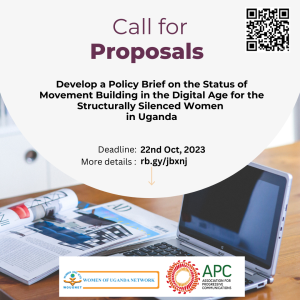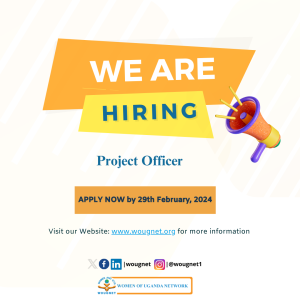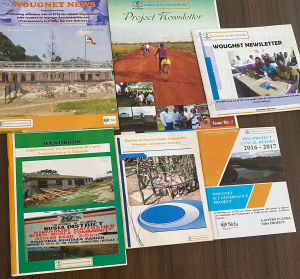One of the reasons some women keep offline is due to lack of knowledge on their digital rights, which deprives them of opportunities that come with technology.
On 12th September 2023, WOUGNET conducted a Capacity-building webinar on Gender and Digital Rights for Women with an aim of equipping Civil Society Organisations with knowledge and skills on gender and digital rights, and the need to integrate it in policies and programs. The webinar had 21 participants including WOUGNET members, feminists and young women.
The webinar training began with welcome remarks from Roseline Babirye, Program assistant, Gender and ICT Policy Advocacy, who welcomed and appreciated everyone for their presence and time. She further noted that WOUGNET envisions an inclusive and just society where women and girls are enabled to use ICTs for sustainable development. To feel safe while online, one needs to know their digital rights, and what needs to be done to protect their rights.
Gorretti highlighted the main objectives of her session; to understand gender, gender concepts and definitions and, to reflect on gender differences and their implication on societies. She explained the definition of gender, its roles, and some gender concepts as explained below;
Gender mainstreaming is intended to contribute to gender equality where men and women have equal opportunities and rights and can benefit equally from programs and development.
Gender needs, that is, men and women have different tasks and needs, such as, child bearing for women and head of household as a man.
Gender equality which refers to differential treatment that is fair and positively addresses a bias or disadvantage that is due to gender roles, norms, or difference between sexes.
Gender balance is a human resource issue calling for equal participation of women and men in all areas of work and programs ( events) etc.
Gender Based Violence is a term for any harmful act that is perpetrated against a person’s will and that is based on socially ascribed differences between females and males.
Gender analysis examines the relationships between females and males, their access to and control of resources, constraints they face relative to each other.
Gender equality, which implies that women, men, boys and girls of all classes and races participate as equal and have equal value.
Esther provided knowledge on digital rights, that is, its definition, emerging technologies like Artificial Intelligence, biometrics, 5G Technology, blockchain plus their positive and negative impacts. She listed some key digital rights including Freedom of Expression, privacy, data protection, Access to Information, Freedom of Assembly and Association, anonymity, Digital security, Digital literacy and inclusion among others.
She further explained the significance of digital rights;
Digital rights supports equal access to information and knowledge, regardless of their background or location.
The internet has become a primary medium for Freedom of Expression.
Digital rights ensure that individuals can express their thoughts and ideas without fear of censorship or undue restrictions.
Digital rights enable economic opportunities by supporting e-commerce, online entrepreneurship, and remote work.
The internet has become a primary medium for Freedom of Expression.
Digital rights enable economic opportunities by supporting e-commerce, online entrepreneurship, and remote work.
Freedom of Expression, privacy, and access to information in the digital realm is essential for the functioning of democratic societies and individual empowerment.
“When you know your rights, you know what can and cannot be done, you understand what’s within the scope of the law, and act accordingly”Esther Nyapendi stated.
In conclusion, continuous education on gender and digital rights is essential, given the constant evolution of technological trends. The rapid and dynamic shifts in technology necessitate a continuous focus on gender and digital rights training, ensuring that individuals can navigate and advocate for their rights effectively in this ever-changing digital landscape.
Written by : Babirye Roseline, Program Assistant Gender and ICT Policy Advocacy






